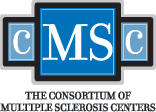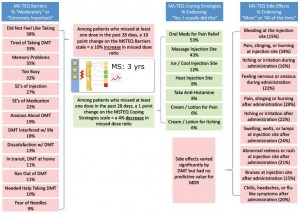 Our research team here at PatientsLikeMe carries out world-class research in collaboration with academic centers, commercial partners (see "how we make money"), and to help answer questions from our patients. We share our findings with the world through this blog, peer-reviewed publications, and by attending academic conferences like the Consortium of Multiple Sclerosis Centers (CMSC) annual conference. This meeting, now in its 24th year, is for neurologists, nurses, researchers, and other healthcare professionals involved in MS to share their knowledge, network, and form new research collaborations.
Our research team here at PatientsLikeMe carries out world-class research in collaboration with academic centers, commercial partners (see "how we make money"), and to help answer questions from our patients. We share our findings with the world through this blog, peer-reviewed publications, and by attending academic conferences like the Consortium of Multiple Sclerosis Centers (CMSC) annual conference. This meeting, now in its 24th year, is for neurologists, nurses, researchers, and other healthcare professionals involved in MS to share their knowledge, network, and form new research collaborations.
In collaboration with our partners at Novartis, our MS community recently participated in a research study exploring the reasons why people don't always take their disease-modifying therapies as prescribed. Adherence to medication is a big issue in chronic conditions; although we all mean to take our meds as prescribed by physicians, good intentions can fall by the wayside when real life interferes with our plans! Decreased adherence could lead to less medication efficacy, more relapses, and a higher burden of disability for MS patients.
By exploring the messages posted in our vibrant MS forum, and carrying out a review of the scientific literature, we constructed a new questionnaire called the "MS Treatment Evaluation Questionnaire" (MS-TEQ) that sought to explore and quantify the barriers that get in the way of people taking their DMTs as prescribed. As part of the validation process we also showed the questionnaire to some local MS patients to ensure it was easy to understand. In December of 2009, we sent out an invitation to 1,209 carefully selected patients and asked them to complete the MS-TEQ. Within just two weeks, we had complete responses back from 442 patients, a 37% overall response rate.

The MS-TEQ addresses three areas: 1) MS-TEQ Barriers: the barriers faced by patients that stop them from taking their meds as prescribed (e.g., forgetting), 2) MS-TEQ SEs: the side effects they experience (e.g., injection site reactions), and 3) MS-TEQ Cope: coping strategies they use to try and cope with these side effects (e.g., using an ice cube to reduce pain and itching). Our analysis found that for every 10 points on the MS-TEQ Barriers scale, patients did not take 10% of their medication as prescribed. However, we also found cause for hope; every coping mechanism they used to try and ameliorate their DMT side effects had a positive effect of 4% on the proportion of their DMTs that they took as prescribed.
At the conference's poster session, we got a lot of interest from attendees and gave away all of our handouts and copies of the questionnaire, so you might be seeing the MS-TEQ in a clinic near you any day now! Our hope is that the questionnaire will help patients and their healthcare providers to understand why someone is struggling to take their medication as prescribed, and to give them a way of measuring this over time. We are currently preparing a manuscript to submit to a peer-reviewed journal to share our findings with the rest of the academic community.
Do you have trouble taking your MS disease-modifying therapies as prescribed? Check out our treatment database. Thousands of our members have written evaluations of the drugs used in MS, including advice and tips on how to stay adherent to your medication to improve your outcomes.
